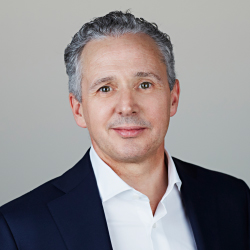Like it or not, geo- and climate politics look set to have an even stronger influence on PNG’s business and investment agenda.
Telstra’s Andrew Penn
‘Financial parameters include Telstra’s financial investment being the minor economic proportion of the overall transaction, with all other capital being sourced on a non-recourse basis.
‘Telstra would own Digicel, with appropriate risk protections, and consolidate it in our financial results.
‘[But] we will only proceed with the transaction if it is in the interests of our shareholders.’
— Andrew Penn, CEO of Telstra (pictured), speaking to analysts recently about the Australian government-brokered negotiations for Telstra to buy Digicel PNG.
As Telstra’s CEO Andrew Penn has acknowledged, he wouldn’t be even thinking of buying Digicel were it not for the encouragement of an Australian government concerned that Digicel’s Irish owner may sell to Chinese interests.
Australia’s Pacific step-up, of which the Australian Infrastructure Financial Facility for the Pacific is a part, is also about countering China’s influence in the region.
These are weighty issues. In nearby Samoa, the debate has caused a ruling party to lose power for the first time since 1988 and the rise of Samoa’s first female prime minister.
The US is getting involved too, through its ‘Build Back Better’ (‘B3W’) program, unveiled at the June G7 meeting. Designed to ‘catalyze hundreds of billions of dollars of infrastructure investment for low- and middle-income countries’, the program is unashamedly ‘values based’.
If Papua New Guinea is able to articulate its infrastructure priorities and needs effectively, money is likely to be there to help, albeit with conditions.
Climate friendly
Another feature of B3W is its focus on ‘climate friendly’ investment, a goal also behind the new Australian Climate Finance Partnership with the Asian Development Bank.
While PNG’s immediate economic future is tied closely to gas, smart investors are also looking beyond the LNG horizon. As Wood Mackenzie’s Ian Thom observes, ‘across the world, policies and regulations for development, operations and financing are becoming increasingly hostile to fossil fuels.’
With the COP 26 UN Climate Change Conference in Glasgow taking place in November, international pressure on all countries to do more to reduce carbon pollution is only going to increase.
Enter Andrew Forrest, CEO of Fortescue Metals Group, whose Fortescue Future Industries (FFI) last week signed a ‘deed of agreement‘ with the PNG Government to look at hydro, solar, wind and geothermal power projects in PNG.
Market distortion?
A couple of questions come to mind when considering the impact of major new international funding that comes tied to specific global objectives:
- Can it be aligned to PNG’s own stated objectives (assuming PNG knows what it wants)?
- What impact will such funding have on existing planned investments and investors in the country?
One case in point might be Vodafone Fiji, which has plans to enter PNG’s telecommunications market and may not expect to meet a ten-tonne gorilla in the shape of Telstra waiting for it.
Another might be a local independent power producer who finds their small-scale investment dwarfed by a green power mega project belonging to a major international company.
Come together
Maybe part of the answer lies in bringing parties large and small, local and international, together to explore where cooperation and partnership can take place. To have a forum where visions can be shared, opportunities considered, and connections made.
In just under three weeks, such an opportunity will occur.
Over three mornings, key players in PNG’s mining and petroleum, manufacturing, retail, agribusiness, energy, infrastructure, construction logistics and other sectors – including several of those mentioned above – will come together with financiers and bankers to do just that.
I’ll be there and you’re invited too.
Registrations to the 2021 Business Advantage Papua New Guinea Investment Conference are now open. You can find out more about it here.









Speak Your Mind